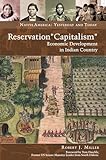Reservation "capitalism" : economic development in Indian country / Robert J. Miller.
Material type: TextSeries: Native America (Praeger Publishers)Publication details: Santa Barbara : Praeger, c2012.Description: xii, 208 p ; 24 cmISBN:
TextSeries: Native America (Praeger Publishers)Publication details: Santa Barbara : Praeger, c2012.Description: xii, 208 p ; 24 cmISBN: - 9781440801112 (hardcopy : alk. paper)
- 1440801118 (hardcopy : alk. paper)
- 9781440801129 (ebook)
- 1440801126 (ebook)
- E98.E2 M55 2012
| Item type | Current library | Call number | Status | Date due | Barcode | |
|---|---|---|---|---|---|---|
 Books (30-Day Checkout)
Books (30-Day Checkout)
|
Nash Library General Stacks | E98.E2M55 2012 | Available | 33710001216287 |
Includes bibliographical references (p. [195]-197) and index.
Historic American Indian economies and property rights -- Euro-American impacts on American Indian economies -- Current economic activity in Indian country -- Tribal gaming -- Attracting investments -- Indian entrepreneurship -- Creating reservation economies.
"This unique book investigates the history and future of American Indian economic activities and explains why tribal governments and reservation communities must focus on creating sustainable privately and tribally owned businesses if reservation communities and tribal cultures are to continue to exist.
American Indians are the poorest people in the United States, and their reservations are the most poverty-stricken; as a result, they suffer from numerous social pathologies that accompany these economic conditions. Tragically, most tribal communities were historically prosperous, comprising healthy, vibrant societies sustained over hundreds or thousands of years.
Native American peoples suffer from health, educational, infrastructure, and social deficiencies that most Americans who live outside of tribal lands are wholly unaware of and would not tolerate. By creating sustainable economic development on reservations, however, gradual, long-term change can be effected, thereby improving the standard of living and sustaining tribal cultures.
Reservation "Capitalism": Economic Development in Indian Country supplies the true history, present-day circumstances, and potential future of Indian communities and economics. It provides key background information on indigenous economic systems and property rights regimes in what is now the United States, and explains how the vast majority of native lands and natural resource assets were lost. The book focuses on strategies for establishing privately and publicly owned economic activities on reservations and creating economies where reservation inhabitants can be employed, live, and buy the necessities of life, thereby enabling complete tribal self-sufficiency and self-determination."--pub. desc.
